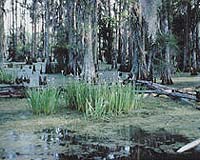| . |  |
. |
Bucharest (AFP) May 21, 2010 Illegal logging and unregulated real estate projects are threatening the Balkans' once abundant forests, home to more than half of Europe's bears and to large wolf populations. To alert public opinion to the looming dangers, national parks in the region will rally this weekend to mark the International Day for Biological Diversity, set a decade ago by the UN General Assembly for May 22. Albania is one of the world's countries worst hit by deforestation. Woodlands that covered 51 percent of its territory prior to 1990 have now receded to 25 percent, according to several environmental non-governmental organisations contacted by AFP. The Vlora region on Albania's southern Adriatic coast is a prime example, where 102 hectares (252 acres) of forests were cleared to make room for illegal construction, according to the Albanian National Forest Association. Even Albania's national parks such as the Lura, considered a gem of the Balkans with its vast expanse of pine, fir and beech trees, have not been spared by illegal loggers. While ten times more trees are felled illegally than legally, according to the national statistics institute, no one has so far been tried or convicted for the crime. Romania, meanwhile, still boasts 300,000 hectares of intact forest, the second-largest woodland expanse in Europe after that in Russia. But its national parks, too, are threatened. In Piatra Craiului Park in the Meridional Carpathians, nearly 300 hectares of forests were chopped down illegally between 2004 and 2007. An environmental group called Agent Green recently staged a protest, using huge logs to write the letter "crime" on one of the now bald mountainsides. "This is a disaster, I've never seen anything like this. If logging continues, the area will turn into a desert," Alex, an environmental activist who declined to give his last name, told AFP. Official figures also paint a bleak picture: more than 170,000 cubic meters (more than six million cubic feet) of illegally cut timber are seized every year in Romania. Moreover, out of 25,000 fines issued over the last three years, only two have ended up in actual convictions, Romanian junior minister for forestry Cristian Apostol told AFP, blaming "legal loopholes" for the situation. Citing various reports, he said more than 180,000 hectares of forests alone have been illegally cleared since the fall of late communist dictator Nicolae Ceausescu in December 1989. While reforestation might have helped the woodlands, it does not repair the damage done to biodiversity, NGOs say. Some of Romania's deforestation is blamed on shifts in ownership after the collapse of communism. "The law was there but the necessary structures to enforce it were missing," Apostol told AFP. Today, he said, there are more than 800,000 private owners of forest land and "it is not easy to control all of them." "Things have improved, however, thanks to regional enforcement bodies and private firms and foundations," he said, adding more than one-quarter of Romania's forests were now privately managed. In neighbouring Serbia, which boasts several intact forests, the Endemit environment group deplored that part of Kopaonik national park had been cleared to create sports grounds. "The government must choose between promoting tourism and protecting the environment," Endemit said. Neighboring Bosnia's forests suffered massive destruction during the 1992-1995 war. Some 100,000 hectares still infested with landmines will remain off limits for many years to come. And local media reports charge that two-thirds of the country's 1,800 sawmills are working illegally. Forest fires have also wrought havoc in the Balkans. In 2007 Macedonia saw 35,000 hectares turn into ash. Floods, landslides and depletion of wildlife are only some of the effects of deforestation, according to the Worldwide Fund for Nature (WWF). This month, the environmental group launched a fund-raising campaign to save Romania's bears, whose habitat is threatened by deforestation. Romania's 6,500 bears represent 60 percent of Europe's total bear population, according to official figures. After years of neglect, authorities and NGOs in the Balkans have started taking action to reverse the decline of forest land. Croatia -- where some 140,000 hectares of forests and woodland are still strewn with mines and where forests in general suffered during the 1991-1995 warfare -- has slapped severe restrictions on construction in forest areas. Romania, meanwhile, has pledged tougher sanctions against illegal lumbering, and along with Macedonia and Serbia has launched serious reforestation programs. Yet Grabriel Paun, the head of Agent Green, warns against expecting miracles. "The trees we are planting now will only turn into a mature forest in 80 years' time," he said. "We won't be there to enjoy it, but we are doing this for the next generations and hoping to see the wildlife return."
Share This Article With Planet Earth
Related Links Forestry News - Global and Local News, Science and Application
 Oiled Louisiana wetlands may have to be burned to be saved
Oiled Louisiana wetlands may have to be burned to be savedVenice, Louisiana (AFP) May 20, 2010 The thick globs of oil now coating delicate grasses along Louisiana's fragile coast threaten a slow and painful death for countless waterfowl, wildlife and their wetland habitat. Cleaning up the maze of marshes, where there's nothing to stand on and shallow-bottomed boats are needed to navigated the narrow channels, is a logistical nightmare. Unlike a beach or rocky shore, crews can't ju ... read more |
|
| The content herein, unless otherwise known to be public domain, are Copyright 1995-2010 - SpaceDaily. AFP and UPI Wire Stories are copyright Agence France-Presse and United Press International. ESA Portal Reports are copyright European Space Agency. All NASA sourced material is public domain. Additional copyrights may apply in whole or part to other bona fide parties. Advertising does not imply endorsement,agreement or approval of any opinions, statements or information provided by SpaceDaily on any Web page published or hosted by SpaceDaily. Privacy Statement |